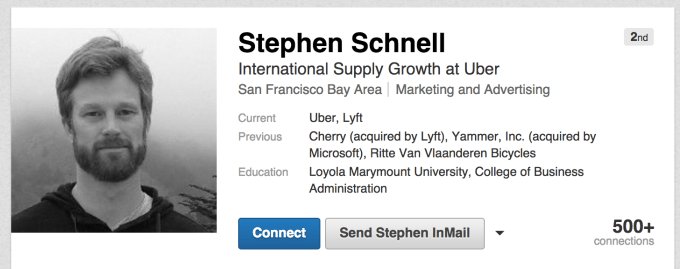Uber’s putting that $1.2 billion in funding to good use poaching execs from its top competitor. After hiring former Lyft COO Travis VanderZanden earlier this month, Uber has now scored Lyft’s former VP of Operations Stephen Schnell to work on international supply growth, according to Schnell’s LinkedIn. Bloomberg reporter Serena Saitto tweeted about the move earlier.
Schnell worked at Lyft since March 2013, after the company acquired his former employer, car washing startup Cherry. Schnell was senior director of operations for a year at Cherry alongside co-founder VanderZander. Schnell had formerly worked as head of marketing at Yammer and as a co-founder of Ritte Bicycles. He left in August and now has come aboard Uber. Schnell was replaced at Lyft by Woody Hartman.

Apparently the kindler, gentler Uber that CEO Travis Kalanick talked about at TechCrunch Disrupt is still a work in progress. Uber’s been widely criticized for its aggressive tactics designed to recruit Lyft’s drivers and degrade its service for customers so it’s easier for Uber to compete. Now it’s moving up the food chain to poaching corporate talent. Uber also recently stole the head of YouTube.com Nundu Janakiram (Disclosure: who I know personally) from Google to be the group product manager in charge of Uber’s driver and passenger apps.
As we’ve seen time and time again, though, users don’t vote with their hearts. They vote with their heads and their wallets. With Uber’s base rate slightly cheaper than Lyft’s in some markets, more significantly when it has price cuts enabled (they recently expired for SF), and seemingly wider availability for quicker pickups, Uber appears to be out-competing Lyft. Most people I know in San Francisco check Uber first when they need a ride, and only check Lyft if there’s high surge pricing on Uber or there happen to be no nearby cars.
Lyft has found some loyal users with its friendly in-car attitude, but when it comes to business, a more ruthless strategy across the board is winning the war for on-demand transportation.
